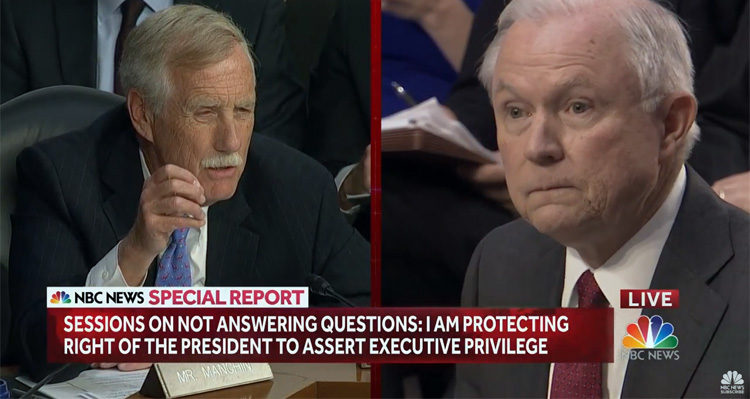
Jeff Sessions gets schooled on legal precedent by Senate Democrats for obstructing their investigation into Russian meddling into the U.S. election.
Attorney General Jeff Sessions’ testimony before the Senate Intelligence Committee on Tuesday stood in stark contrast to that of former FBI Director James Comey last week.
Having fully documented the areas of concern as events unfold, Comey’s testimony was clear, concise and exact. While there were areas in which Comey refused to answer questions in a public hearing, he confirmed to Senators that he would answer all questions in a closed session.
By contrast, Sessions relied on vague answers stating I have wracked my brain, I don’t recall, I have no recollection, I don’t remember…
Asked if he would provide documents to include personal notes and emails to corroborate his answers, Sessions repeatedly replied “as appropriate,” refusing to give a definitive answer as to what that means.
Sessions invoked privilege on several instances, denying that he – in fact – was invoking privilege. He claimed in some instances that a “longstanding Dept. of Justice policy” supported his refusal to answer questions and in other instances claimed his was acting to preserve Trump’s right to invoke executive privilege in the future.
Kamala Harris asked pointed questions regarding that Dept. of Justice policy, to include whether it was in writing. Sessions responded that he believed it was in writing. Harris followed up by asking if he had reviewed the policy prior to his testimony, and he responded that he had not.
As The Guardian reports, Harris asked Sessions if he “reviewed with lawyers the law regarding what he can and can’t share.”
- Sessions: “we discussed the basic parameters of testimony. I have not discussed disclosure rules.”
- Harris: Will you commit to turning over documents where required:
- Sessions: I’ll commit to looking at it.
- Harris: Did you have any undisclosed conversations with Russians?
- Sessions: I don’t recall it but I can’t testify as to what was said for example at the GOP convention.
- Harris: Contacts with Russian businessmen or Russian nationals?
- Sessions: I don’t believe so, although there were a lot of people at the convention. … I’m not able to be rushed this fast, it makes me nervous.
- Harris: Any communications with Trump officials about Russia or Russian interests in the US before January 20?
- Sessions: “I believe I did… have conversations” about better relations between Russia and the United States.
Sessions appeared defensive, angry, confrontational throughout the hearing, with Democratic members of the committee expressing frustration with his testimony. He also appeared to be doing his best to use up the clock to limit questions raised by Democrats.
While Republicans did their best to try to help Session portray the Trump administration in the most positive light possible, Democratic members of the committee such as Senators Ron Wyden of Oregon, Martin Heinrich of New Mexico, Angus King of Maine, Kamala Harris of California, and Joe Manchin of West Virginia ripped AG Sessions, accusing him of deliberately obstructing the Senate investigation through his failure – or refusal – to answer questions.
All-in-all, it would appear that Sessions’ testimony did much more harm that good for the Trump administration, although only time will truly tell the outcome of the Trump-Russia scandal.

You must be logged in to post a comment Login